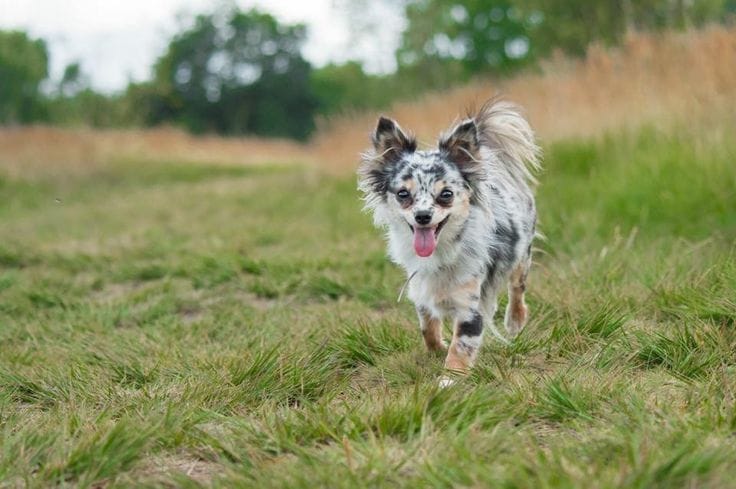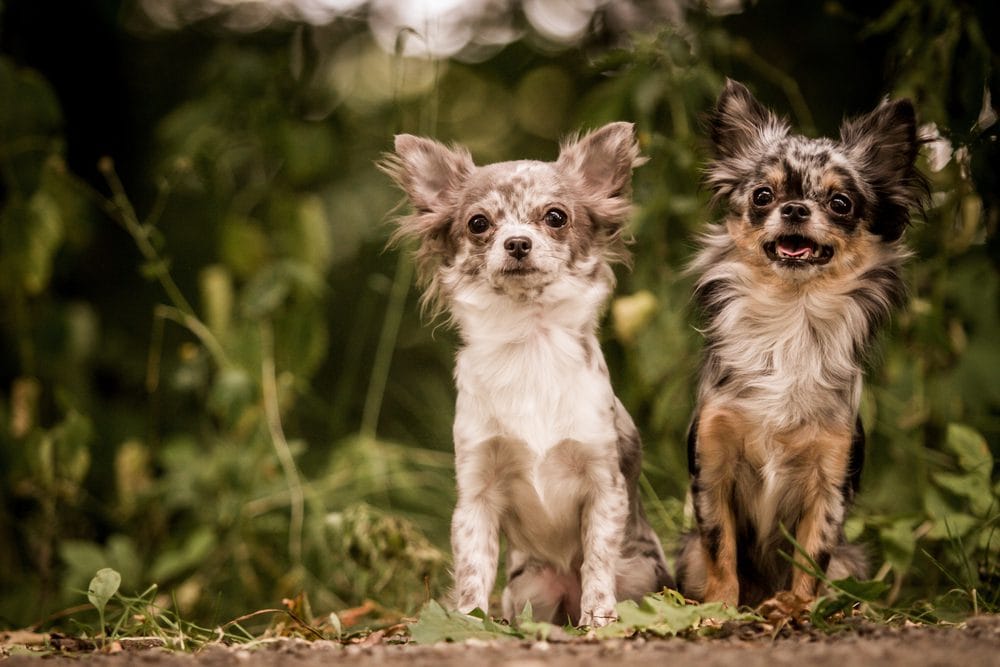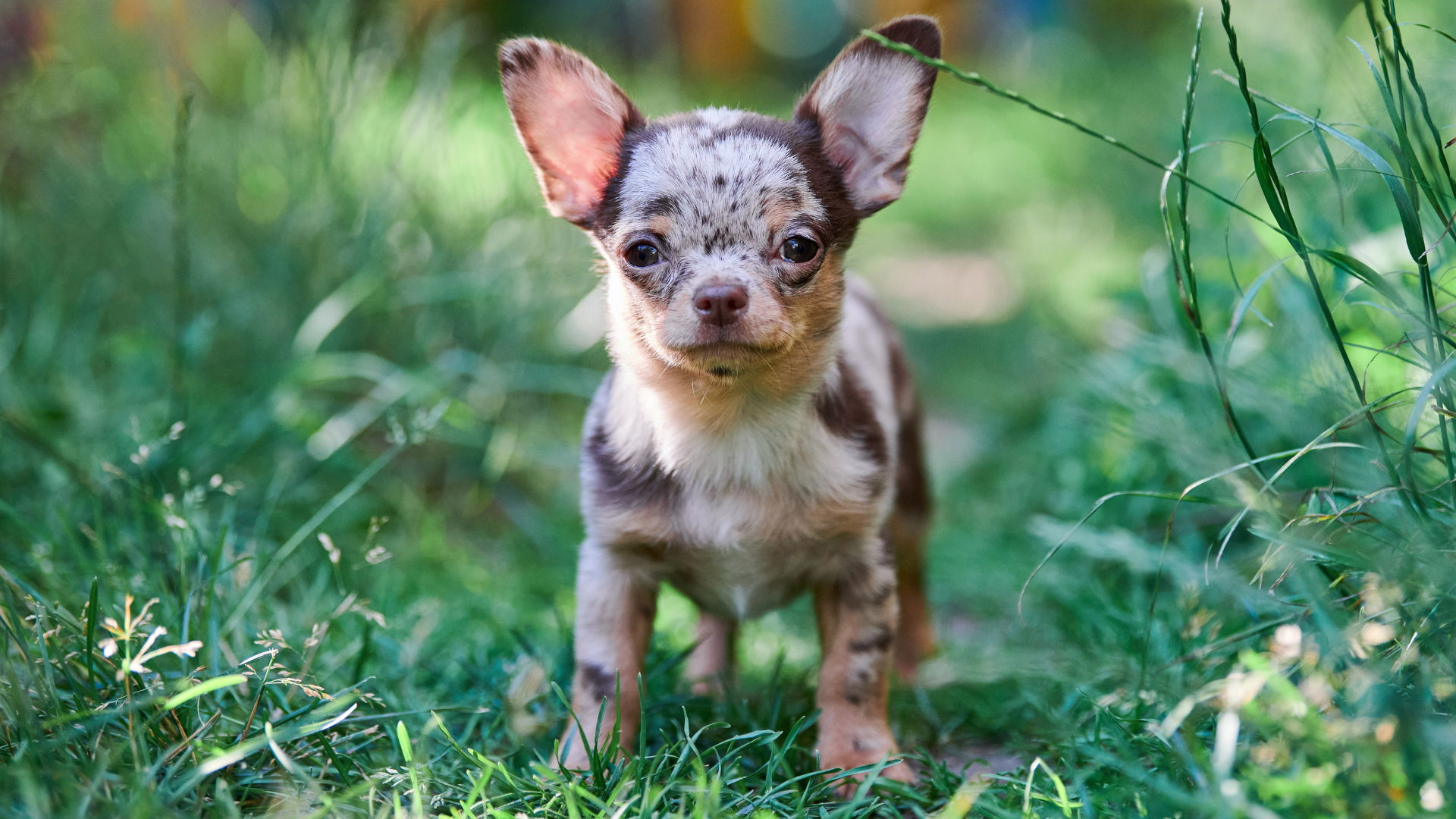Merle Chihuahuas are a unique and eye-catching variation of the popular toy breed. Characterized by their distinctive coat pattern, which features a marbled or mottled appearance, these dogs have become increasingly popular in recent years. Despite their growing popularity, however, there remains some controversy and confusion surrounding the genetics and breeding of Merle Chihuahuas.

One of the most striking features of Merle Chihuahuas is their coat pattern, which is caused by a dominant gene that affects the distribution of pigment in the hair. This gene can produce a range of colors and patterns, from blue and silver to red and chocolate, and can also affect the dog's eye color and skin pigmentation. While many people find the Merle pattern to be aesthetically pleasing, there are concerns about the health effects of breeding for this trait, as it is associated with a number of genetic disorders and can lead to deafness, blindness, and other health problems.
Despite these concerns, Merle Chihuahuas remain a popular choice for many dog lovers, and there are many breeders who specialize in producing these unique dogs. Whether you are considering adding a Merle Chihuahua to your family or simply want to learn more about this fascinating breed, there is much to discover about these charming and distinctive dogs.
Breed Overview
The Merle Chihuahua is a small dog breed that is known for its distinctive coat pattern. This breed is a variation of the standard Chihuahua and is recognized by the American Kennel Club (AKC) as a separate breed. In this section, we will provide an overview of the Merle Chihuahua breed, including its origins, physical characteristics, and the science behind its unique coat pattern.
Origins of the Merle Chihuahua
The Merle Chihuahua is believed to have originated in Mexico, just like its standard Chihuahua counterpart. However, the Merle variation was not recognized as a separate breed until much later. The Merle gene is a dominant gene that can be passed down from either parent, which means that even two standard Chihuahuas can produce Merle offspring.
Physical Characteristics
The Merle Chihuahua is a small dog that typically weighs between 2 and 6 pounds. It has a short, smooth coat that can come in a variety of colors, including black, brown, fawn, and white. The Merle pattern is characterized by patches of darker color on a lighter base, and can also include speckles or spots. This pattern can occur in any of the colors mentioned above.
In addition to its unique coat pattern, the Merle Chihuahua has a distinctive apple-shaped head, large eyes, and erect ears. It has a compact, muscular body and a tail that curls over its back. Overall, the Merle Chihuahua is a cute and charming dog that is perfect for those who want a small companion.
Merle Gene Explained
The Merle gene is a dominant gene that determines the coat pattern of the Merle Chihuahua. This gene causes a dilution of the base color, resulting in patches of darker color on a lighter base. However, the Merle gene can also cause health problems in dogs if it is present in two copies. This is known as double Merle, and can result in vision and hearing problems, as well as other health issues.
In conclusion, the Merle Chihuahua is a unique and charming breed that is perfect for those who want a small companion. Its distinctive coat pattern and apple-shaped head make it stand out from other Chihuahuas, and its compact size makes it easy to take care of. However, it is important to be aware of the health risks associated with the Merle gene, and to only purchase dogs from reputable breeders who test for these issues.
Health and Care

Common Health Issues
Merle Chihuahuas are generally healthy dogs, but like all breeds, they are prone to certain health issues. One of the most common health problems in Chihuahuas is dental disease. This can be prevented by regular teeth brushing and dental check-ups.
Another common health issue in Merle Chihuahuas is patellar luxation, a condition where the kneecap dislocates from its normal position. This can cause lameness and pain. Regular exercise and maintaining a healthy weight can help prevent this condition.
Merle Chihuahuas are also prone to eye problems such as cataracts and progressive retinal atrophy. Regular eye check-ups can help detect these issues early and prevent them from worsening.
Diet and Nutrition
A balanced diet is essential for the health and well-being of Merle Chihuahuas. They require a high-quality dog food that is rich in protein, vitamins, and minerals. It is important to avoid overfeeding as Merle Chihuahuas are prone to obesity, which can lead to health problems such as joint pain and diabetes.
It is recommended to feed Merle Chihuahuas small, frequent meals throughout the day rather than one large meal. Fresh water should always be available for them.
Grooming Needs
Merle Chihuahuas have a short, smooth coat that requires minimal grooming. Weekly brushing with a soft-bristled brush can help remove loose hair and keep their coat shiny and healthy.
Regular nail trimming and cleaning of the ears can also help maintain their overall health and hygiene. It is important to use dog-specific nail clippers and ear cleaning solutions to avoid any potential injuries or infections.
Overall, with proper care and attention, Merle Chihuahuas can live long, healthy lives. Regular check-ups with a veterinarian and a balanced diet can help prevent many health issues.
Behavior and Training
Temperament
Merle Chihuahuas are known for their lively and energetic personalities. They are affectionate and loyal towards their owners, but can be shy and reserved around strangers. They are also very alert and have a tendency to bark excessively, which can be a challenge for some owners.
Training Tips
Training a Merle Chihuahua can be a rewarding experience, but it requires patience and consistency. Positive reinforcement techniques, such as treats and praise, are effective in training these dogs. It is important to start training early and to be consistent with commands and expectations.
Merle Chihuahuas can be stubborn and may require extra patience during training. It is important to avoid harsh punishment or negative reinforcement, as this can lead to fear and aggression in these dogs.

Socialization
Socialization is important for all dogs, but especially for Merle Chihuahuas. These dogs can be prone to anxiety and fear, which can be mitigated through exposure to different people, animals, and environments. It is important to start socialization early and to expose the dog to a variety of experiences in a positive and controlled manner.
Overall, Merle Chihuahuas are intelligent and trainable dogs, but they require patience and consistency from their owners. With proper training and socialization, these dogs can make wonderful companions for individuals and families alike.
Breeding and Ethics
Breeding Considerations
Breeding Merle Chihuahuas involves careful consideration of several factors. Breeders must ensure that both the male and female dogs are healthy and free from any genetic disorders. Additionally, they must consider the color and pattern of the dogs' coats, as well as their temperament and overall conformation.
It is important to note that breeding two Merle Chihuahuas together can result in puppies with a higher risk of genetic disorders, such as deafness and blindness. Therefore, responsible breeders will typically only breed Merle Chihuahuas with non-Merle Chihuahuas to minimize this risk.
Genetic Testing
Genetic testing is an essential part of responsible breeding. Breeders should test their dogs for any genetic disorders that are known to affect the Chihuahua breed, such as patellar luxation and hydrocephalus. In addition, they should also test for the Merle gene to ensure that they are not breeding two Merle Chihuahuas together.
By conducting genetic testing, breeders can ensure that they are producing healthy puppies that are free from any genetic disorders.
Ethical Concerns
Breeding Merle Chihuahuas can be controversial due to the potential health risks associated with the Merle gene. Some breeders may prioritize producing rare and unique coat colors over the health and well-being of the dogs.
Therefore, it is important for breeders to prioritize the health and well-being of their dogs above all else. They should only breed dogs that are healthy and free from any genetic disorders, and they should avoid breeding two Merle Chihuahuas together to minimize the risk of health problems in their puppies.
Overall, responsible breeding practices are essential when it comes to producing healthy and happy Merle Chihuahuas. By prioritizing the health and well-being of their dogs, breeders can ensure that they are producing puppies that will live long, healthy lives.
Adoption and Purchase

Finding a Merle Chihuahua
Merle Chihuahuas can be found in animal shelters, rescue organizations, and from breeders. It is recommended to start by checking with local animal shelters and rescue organizations as they may have a Merle Chihuahua available for adoption. If a Merle Chihuahua is not available, then consider contacting a reputable breeder.
Costs
Adopting a Merle Chihuahua from a shelter or rescue organization can cost anywhere from $50 to $500 depending on the organization. Purchasing a Merle Chihuahua from a breeder can cost anywhere from $500 to $3000 depending on the breeder, lineage, and location.
In addition to the initial cost, there are additional costs to consider such as food, toys, bedding, and veterinary care. It is important to budget for these expenses to ensure that the Merle Chihuahua is well-cared for.
Responsible Breeders
When purchasing a Merle Chihuahua from a breeder, it is important to find a reputable and responsible breeder. A responsible breeder will provide health clearances for the parents, allow potential owners to meet the puppies and parents, and provide documentation for the puppy's vaccinations and deworming.
It is also important to avoid purchasing from puppy mills or backyard breeders. These breeders often prioritize profit over the health and well-being of the puppies and their parents.
Overall, adopting or purchasing a Merle Chihuahua can be a rewarding experience. It is important to do research and make informed decisions to ensure that the Merle Chihuahua is well-cared for and loved.
Living with a Merle Chihuahua
Merle Chihuahuas are a unique and popular breed of dog. They have a distinctive coat pattern that is characterized by various shades of blue, gray, and black. These dogs are known for their friendly and playful personalities, making them great pets for families and individuals alike. However, before bringing a Merle Chihuahua into your home, it is important to understand their specific needs and requirements.
Home Environment
Merle Chihuahuas are small dogs that can adapt well to different living environments. They are suitable for living in apartments or houses, as long as they have enough space to move around and play. These dogs are generally active and enjoy being outdoors, but they can also be content with indoor activities. It is important to provide them with a comfortable bed or crate to sleep in, as well as a safe and secure space to play and relax.
Exercise Requirements
While Merle Chihuahuas are small dogs, they still require regular exercise to maintain their health and well-being. They benefit from daily walks or playtime in a fenced yard. It is important to keep them on a leash when outside, as they can be prone to chasing after small animals. These dogs also enjoy playing with toys and games that stimulate their minds and keep them active.
Family Integration
Merle Chihuahuas are social dogs that enjoy being around people. They can make great family pets, but it is important to supervise interactions between them and young children. These dogs can be sensitive to loud noises and sudden movements, so it is important to create a calm and peaceful environment for them. It is also important to provide them with proper training and socialization to prevent any behavioral issues from arising.
In conclusion, living with a Merle Chihuahua can be a rewarding experience for those who are willing to meet their specific needs and requirements. These dogs are friendly, playful, and adaptable, making them great pets for a variety of living situations. By providing them with a comfortable home environment, regular exercise, and proper training, you can ensure that your Merle Chihuahua is happy and healthy for years to come.

Conclusion
In conclusion, Merle Chihuahuas are a distinctive and appealing variation of the Chihuahua breed, known for their unique coat patterns and lively personalities. While their eye-catching appearance has made them popular, it's essential to be aware of the potential health risks associated with the Merle gene.
Prospective owners should prioritize finding reputable breeders who conduct proper genetic testing and avoid unethical breeding practices. With the right care, including a balanced diet, regular exercise, and proper socialization, Merle Chihuahuas can make wonderful, loving companions. Whether adopted from a shelter or purchased from a responsible breeder, these charming dogs can bring joy and companionship to any household.




